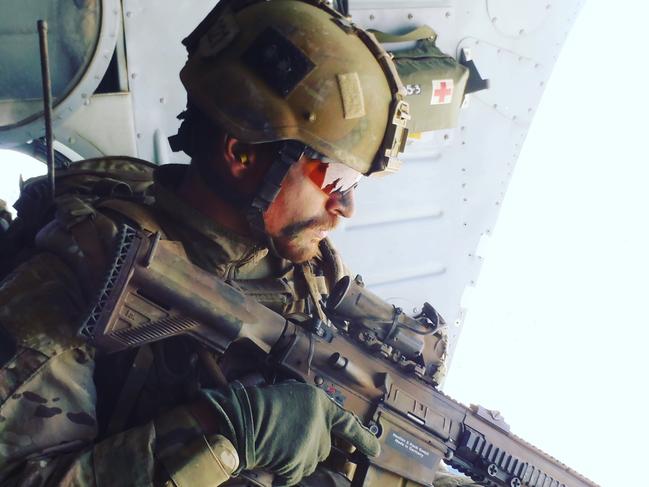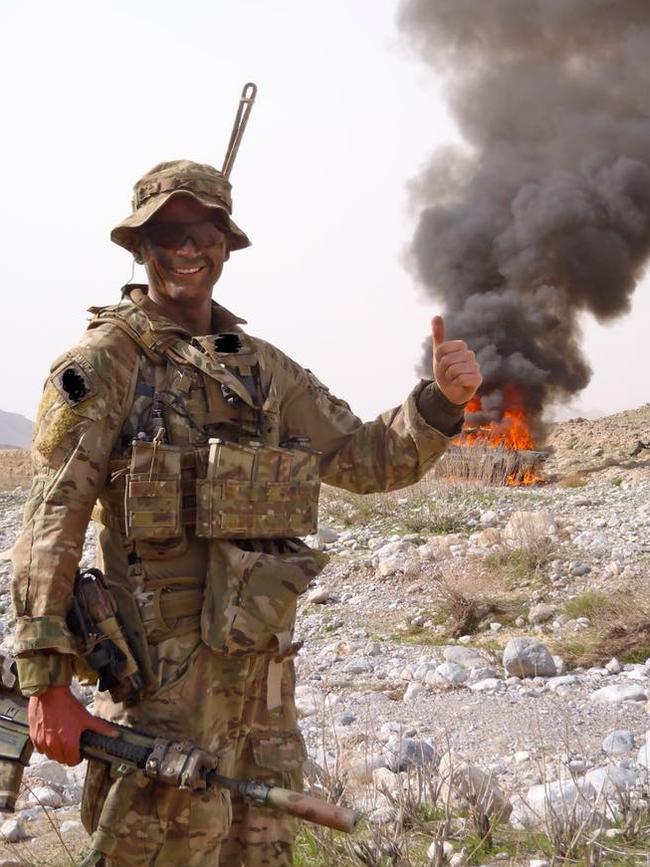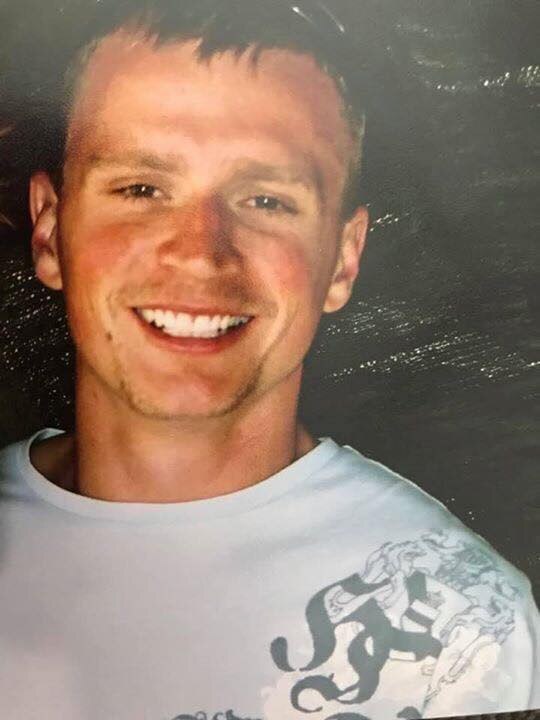Ian Turner inquest: Doctor says commando had ‘chronic’ PTSD, flashbacks
A doctor treating Australian commando Ian Turner, who killed himself in 2017, has told an inquest the soldier had “severe” chronic PTSD, constant flashbacks and self medicated with drugs and alcohol.
Police & Courts
Don't miss out on the headlines from Police & Courts. Followed categories will be added to My News.
- What you get as a Daily Telegraph subscriber
- Special Forces officer: ‘I can’t protect my guys at home’
A doctor treating a commando who took his life in 2017 said he was one of the worst cases he had seen and that the soldier had admitted he killed “so many people” while on secret missions, an inquest heard.
An inquest into the death of Sergeant Ian Turner has been told by his psychiatrist Dr Muhammad Malik from St John of God in Richmond that his chronic PTSD “was so severe”, but he had engaged in treatment in the months leading up to his death.

Dr Malik said from the first session he had with the 35-year-old in April 2017, three months before he died, he was “physically struggling” and “shouldn’t be going back to work”.
As treatment progressed over four weeks, Dr Malik said Sgt Turner became more open with his combat experience and said “I can’t live with myself, I have killed innocent (people)”.
“For people to have PTSD, you have to have a sense of morals and guilt … he felt responsible which is against any criminals who have no morals or conscience,” Dr Malik told the inquest.
“It was very clear when you saw him this was a person struggling, he wasn‘t sleeping … he had constant flashbacks and self medicated with drugs and alcohol.”
He also had observed that Sgt Turner didn’t trust the Defence Force and had requested they weren’t given full access to his full medical records.


Sgt Turner was also advised by Dr Malik that he should be medically discharged so that an “obvious trigger” would be taken away.
But in July, Sgt Turner returned to work and reported it had become a mental trigger, including seeing people in uniform which was a “triggering nightmare” and caused him to relive trauma.
“He was not going to be fixed … it’s about learning to live with it (PTSD),” Dr Malik said. “(I was) improving (his) quality of life, not curing it … (there’s) no medication for PTSD.”
At the time of his death, Sgt Turner was in the process of moving towards a medical discharge from the army.
Sgt Turner’s wife Joanna continued her evidence and said she never received the proper level of care and support by the Defence Force, despite repeatedly raising her concerns.
She said she had “exhausted every option” for family welfare support, but was never given adequate help.
Mrs Turner had turned to more than five different people and organisations, including two army chaplains and Veterans and Families Counselling Service, now known as Open Arms.
MORE NEWS
Mejid Hamzy assassin caught on CCTV
Crown casino ‘allowed’ suspected money laundering: Inquiry
‘Lovely young woman’ slain at home had AVO on partner
At one point, she met with the commanding officer at Michel‘s Patisserie after she wrote a letter to him in 2014 to discuss her husband’s case.
“I was pretty powerless to change things at home, I needed help, I needed assistance,” she told the inquest.
“My intent was to raise concerns about Ian’s current state, what had happened up until that point and the lack of care provided for my family.”
Instead Mrs Turner, who enlisted in the army as a reserve in 2013, was forced to continue enduring Sgt Turner’s excessive alcohol consumption and violence towards her.
In another instance she recalled speaking to a psychologist treating her husband in the army who was “very resistant” to listening to her concerns
“I was raising concerns Ian was drinking at home and he would reply ‘well that‘s not what he is reporting to us … there is no issue here … I can’t have this conversation here’,” she told the inquest.
Sgt Turner was a highly trained soldier who was deployed to Afghanistan and Iraq a number of times and witnessed multiple deaths of fellow soldiers.
Months before Sgt Turner died, he wrote a series of messages to his sister saying how his dream job in the military had destroyed him and was dependent on alcohol while his PTSD overwhelmed him.
“It just hurts that my lifelong dream and my dream job is the very thing that destroyed me,” he wrote.
“I tried to take on too much pain and protect my guys too much. I should have shared the pain more.
“But with my PTSD, anxiety, depression and alcohol dependency I’ve just had enough. I spent seven years of my life overseas fighting … I’ve had enough.”
Mrs Turner also said her husband had also spoken frequently, mostly while drunk, about wanting to die while on deployment and had told her that he had deliberately gone on operations without his body armour on hoping to be killed.
She said he spoke about having stabbed someone to death in Afghanistan, and having “executed” another person.
But Sgt Turner was hoping to move on with his life and was looking to study in Canberra for a PHD.
Broken soldier sent to war zone
Wife of a Special Forces Officer prescribed 400 pills in lead up to death tried to get him help for six years, inquest told
A Special Forces soldier who served more than 16 years spent his final months with “meaningless tasks” and felt the Defence Force was “continually punishing him” before he took his life, a coroner’s inquest heard.
Ian Turner was exposed to “numerous traumatic events” before he began excessively drinking and developed severe PTSD, a disturbed sleep pattern and persistent anxiety, Counsel assisting the inquest Kristina Stern, SC, told the inquest.
The 35-year-old was deployed seven times, including to East Timor, Iraq and Afghanistan but said he felt his self worth was “destroyed” after he was punished over a 2016 incident involving pornography.
In her opening address to the Lidcombe Coroner’s Court, Ms Stern said his deployment had caused a “significant change” in Sergeant Turner’s behaviour which also led to his marriage breakdown.
The deaths of fellow soldiers, including commando Luke Worsely killed in 2007 during an encounter with the Taliban in Afghanistan and Corporal Cameron Baird in 2013 also in Afghanistan, contributed to his mental health decline.
His wife Joanna said with each deployment, her husband returned more violent and his alcohol consumption had increased, which Sgt Turner used as a way to manage his PTSD.
In May 2014, he was admitted to Sydney Southwest Private Hospital where he was treated by psychiatrist Dr Sujaya Sringeri.
Sgt Turner was discharged from hospital and was expected to continue treatment for the next year, but had already stopped taking his medication by October.
Ms Turner also said that she wrote a letter to Sergeant Turner‘s commanding officer in 2014 to raise concerns about what was happening within her family, and later met with the commanding officer at a cafe to discuss Sergeant Turner’s case.
“I just think my intent was to raise awareness of what was occurring. He didn't leave me thinking that anything in particular was going to happen,” Ms Turner told the inquest.
“What would have been appropriate was to have the way he was interacting with people on a general level addressed.
“He was very insubordinate, he was very aggressive and violent at home, he was a power unto himself. There were no boundaries on Ian.”
He was also subjected to an apprehended violence order due to domestic violence against his wife.
But despite the AVO and committal to the psychiatric hospital, Sgt Turner was deployed to Iraq in 2015 and again in 2016.
Ms Turner said that her husband and his colleagues boasted about being able to manipulate the mental health professionals who were treating them.
“I was present in conversations when Ian was speaking with colleagues who also saw the same treating psychiatrist and they would share or compare notes on how to get [the psychiatrist] to do or say certain things,” she said.
“They were sitting at my kitchen bench and they were laughing about how they could get certain medical professionals to make certain decisions, so the way that they sat, the way that they spoke, the way they presented, the clothes they wore, the way they did their hair, the two of them were comparing notes.”
During his 2016 deployment, he reported being part of an operation where he was forced to retrieve the body of an American soldier which had been buried for a decade.
He told Dr Sringeri in February 2017 that he was triggered by the incident and had felt “intensely helpless” and described how the smell of the body affected him.
The final blow came in 2016 when he pleaded guilty and was charged by a Defence Force tribunal after he placed a pornographic picture of a naked man on a pallet on board a Royal New Zealand Airforce plane.
In the lead up to his death, Sgt Turner had told a close friend how his “self worth (was) destroyed” after he had been charged and then moved to an “inferior unit”.
The change in units was seen as a “double punishment” for the pornographic material and felt that his only support team was taken away with no warning.
The father-of-two took his own life on July 15, 2017 after being given a bulk prescription of 400 pills in a matter of weeks.
In one of the letters found near Sgt Turner, he had written “nobody can help me, I am too far gone. Please let me go, I have suffered enough”, the inquest heard.
Expert medical witnesses will give evidence today (Tuesday) and are expected to say that Sgt Turner did receive adequate care from various doctors.

